SACRAMENTO, Calif. — A coronavirus outbreak in the California Legislature has indefinitely delayed the state Assembly’s return to work from a scheduled summer recess, highlighting the rapid spread of the virus in a state that has imposed new restrictions on bars and restaurants following a surge of cases and hospitalizations.
Speaker Anthony Rendon’s office confirmed five people who work in the state Assembly have tested positive for the coronavirus. That includes Assemblywoman Autumn Burke, a Democrat from Inglewood, who is believed to have been infected while on the Assembly floor last month when lawmakers returned to the state Capitol in Sacramento to approve a $202.1 billion state budget.
“The Assembly will remain in recess until further notice,” Rendon said. “We have taken this decision, as we did in March, to protect members, staff and the public from exposure, and it comes in light of recent news of positive coronavirus tests in the Capitol.”
Many state legislatures shut down earlier this year as the pandemic took hold of the U.S., including California, which missed nearly two months of work in its first unscheduled recess in 158 years. But many legislatures eventually returned to work with restrictions in place to limit the spread of the virus.
In California, those restrictions include mandatory masks for lawmakers on the floor, plus physical distancing in the chamber. Burke said both she and the person who exposed her to the virus were wearing masks.
“Currently, my daughter and I have no symptoms, but will be remaining in quarantine until released by a doctor,” Burke wrote in a message posted to her Twitter account.
The delay comes as more young people are getting the coronavirus in California, fueling a surge of hospitalizations across the state and prompting Gov. Gavin Newsom’s administration to step up enforcement of new restrictions on bars and restaurants.
Statewide, coronavirus hospitalizations have increased 56% in the past two weeks while the number of confirmed cases has jumped 53%. In Los Angeles County, where one quarter of the state’s population lives, people between the ages of 18 and 40 now account for 25% of all coronavirus hospitalizations — up from about 10% in April.
“Unfortunately where we are today is different than where we were two, three or four weeks ago. Cases are surging, hospitalizations are increasing and mostly this is a reflection of a lot more community spread,” Los Angeles County Public Health Director Barbara Ferrer said.
In response, Newsom has ordered bars, indoor restaurant dining and other indoor businesses to close for the next three weeks in 23 of the state’s 58 counties. Over the busy Independence Day weekend, Newsom’s administration deployed “strike teams” of state inspectors to monitor businesses in those counties. But the teams only issued 52 citations because most business owners complied with state directives, Newsom said Monday.
“The overwhelming majority of people were doing the right thing,” he said. “Even if people were out of compliance, the engagement got people back into compliance very quickly.”
For most people, the new coronavirus causes mild or moderate symptoms, such as fever and cough that clear up in two to three weeks. For some, especially older adults and people with existing health problems, it can cause more severe illness, including pneumonia and death.


